The 60th Fellsman: race report
Friday
I'm waiting in a queue. There are probably a hundred people ahead of me, nearly invariably decked in expensive technical down jackets and brightly-coloured running shoes. Nearly everyone has a bag-for-life packed full to the brim with trail running kit: lightweight running backpacks and soft flasks and moisture-wicking baselayers and vacuum-sealed ziploc bags of marzipan. We grumble amongst ourselves and every five minutes or so, pick up our bags-for-life and assorted sleeping kit, shuffle forward a couple steps, and drop it again. We're waiting in line for registration the night before the 60th Fellsman.
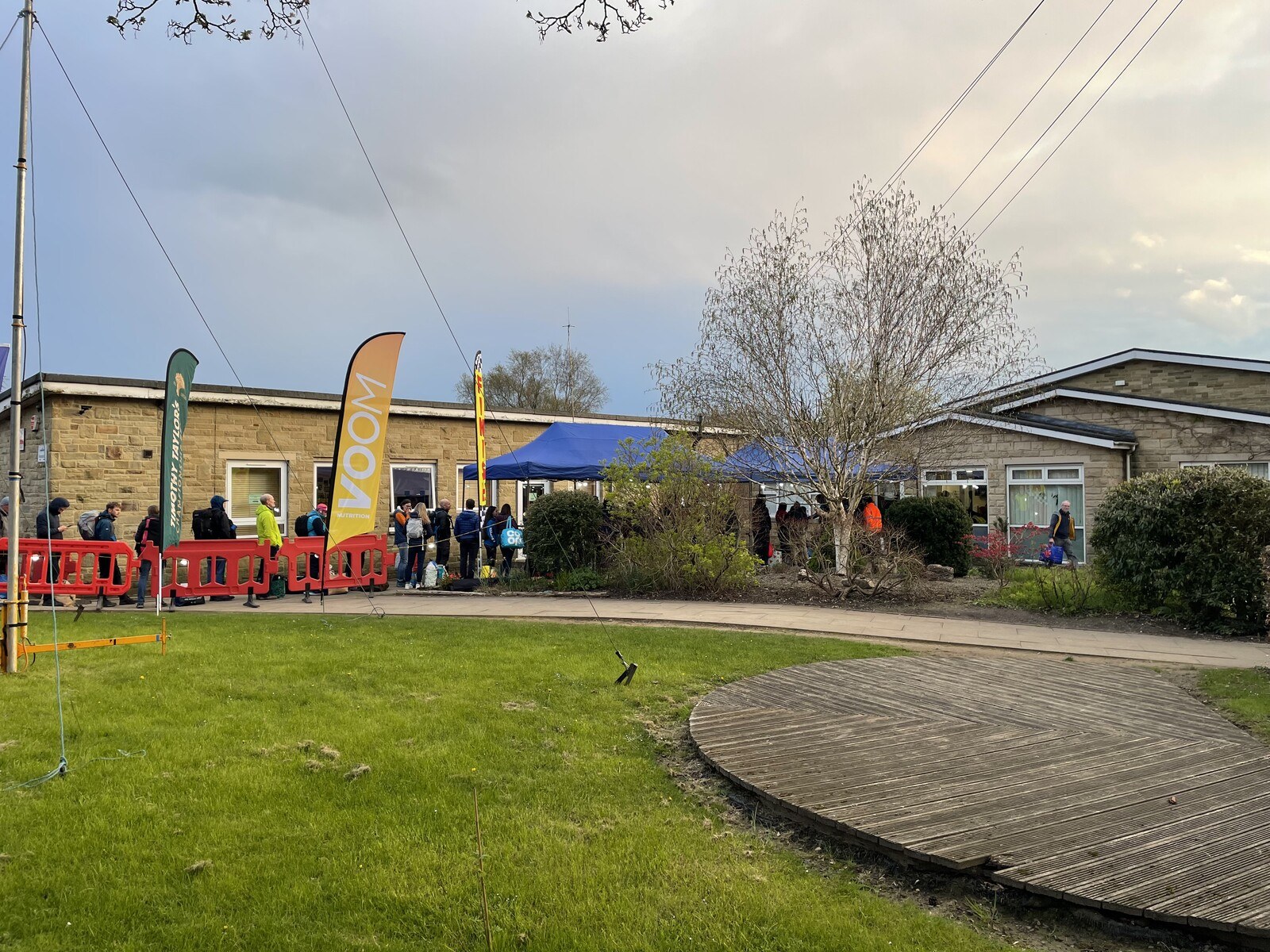
The sun sets and the industrial lights erected outside of the Upper Wharfedale School are illuminated. A man with a dolly piled high with bread and pasta and cans of chopped tomatoes rolls by and awkwardly navigates the barriers and fairy lights directing runners into the school. At the head of the queue, slightly overwhelmed staff collect our names and dole out bracelets for the buses from Threshfield to the start line at Ingleton. The earliest queuers—who'd arrived before the queue even opened at 19:00, in typical British fashion—have already nabbed all of the tickets for the last bus in the morning, affording them an extra 15 minutes' lie-in and saving them the awkward wait around at the start line—but costing them the opportunity to stand in the half-hour toilet queue directly before the race starts. I collect a green bracelet for the 6:15 bus and make my way into the school hall for kit check.
The queue here is much shorter. Runners mingle at the lunch tables arranged around the room, poring over maps and comparing nutrition strategies. On the stage at the end of the hall, two rows of kit check invigilators arranged in a V nitpick the contents of folks' bags-for-life. On one side, a man who I recognise as one of the event organisers is explaining to a runner that his 500kcal of emergency rations must be ready-to-eat: that dehydrated meals aren't permissible. To be fair, this rule was pretty plainly stated on the website. Across from him, a runner throws his arms up in front of him, in textbook pleading. It's not clear to me what's missing from his kit, but I can guess from the shiny package that's being passed back and forth between the runner and the staff that there is something amiss with his foil poncho. This year, they're requiring a foil poncho with a hood. A regular foil blanket will not do. I understand that this has caused chaos among the runners.
A man behind me in the queue tells his friend, "I'm not worried about the run, and I'm not worried about the dark. I'm not even worried about nutrition. As far as I'm concerned, the biggest hurdle is the kit check." He's a local and he says hurdle with a vowel sound that I suspect no one but Yorkshiremen can produce.
The runner with the dehydrated food is re-packing his kit and the organiser who audited it is moving with purpose across the stage. He briskly descends from the stage and walks directly up to me specifically and apologises for the queue. The man behind me says that, as British people, we love to queue. I try to say something about how we've signed up for a really long race and therefore we're all likely to be very patient, but I stammer and trip over my words and the organiser has moved briskly on anyway.
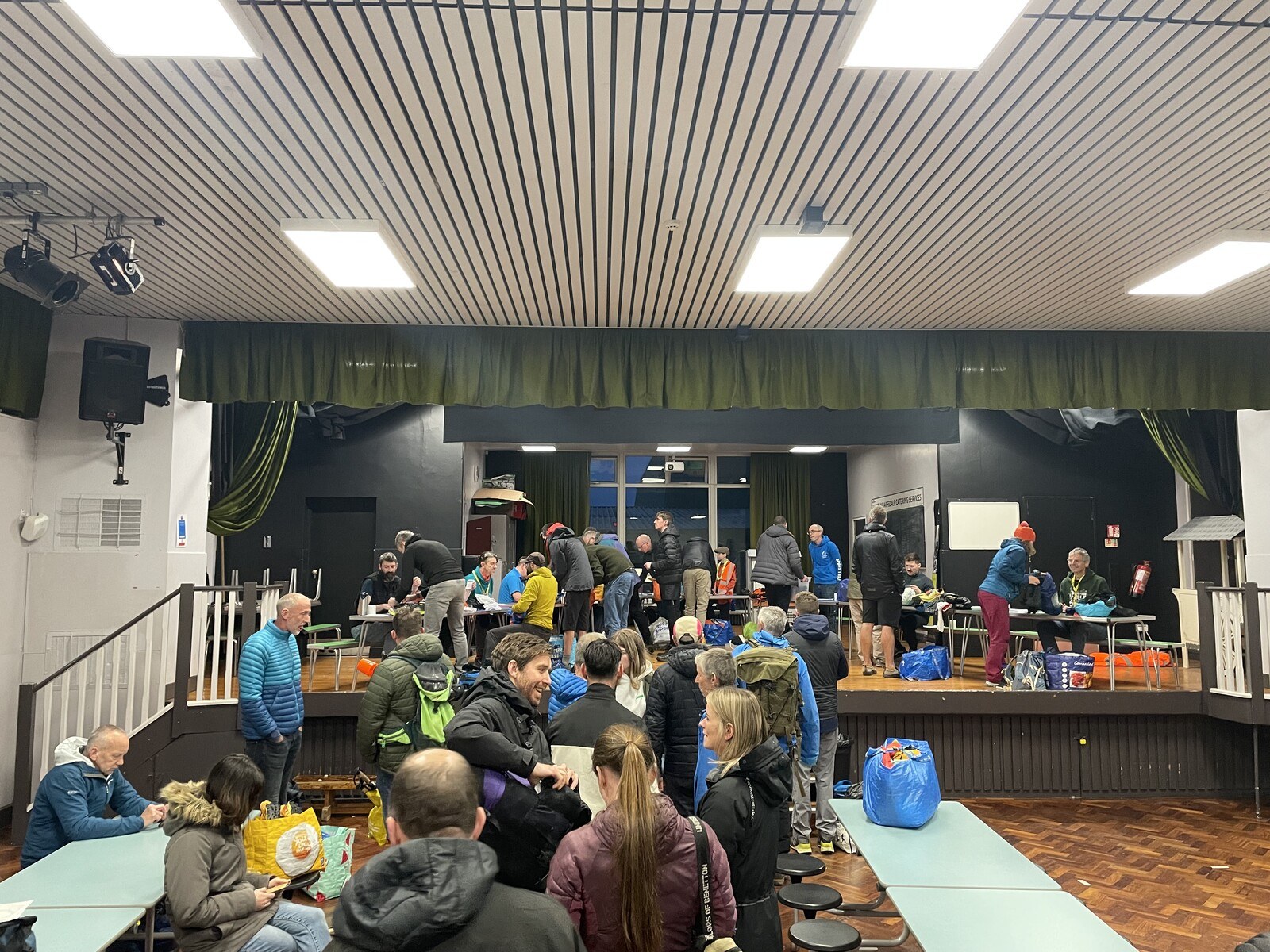
My kit check is performed by an extremely no-nonsense man with an American accent. I sweat bullets as I rifle through my antibacterial bag-for-life for my fleece hat. I come up with my balaclava and offer it weakly. The auditor says, "But the hat is in there, right?" I reassure him weakly as I come up with map & compass. When I've emptied the contents of the bag on his desk and everything has been checked over, my hat turns up, somehow miraculously, the last item at the bottom of the bag. He signs the kit check slip and says, "Good luck." I return, "Thanks, I'm gonna need it!" somewhat too cheerily; then I think better of it and say, "Actually, I won't need it—I've done a lot of practice," and shove everything into my bag and scurry away.
Kit checked and the highest hüeudle cleared, I stash my stuff in the corner and find the queue for food. I have to dash back to fetch my titanium Mont Bell cup when I see people coming away with hot drinks. When the primary school student behind the counter asks what I'd like to drink, I numbly ask for a coffee, realising only too late that it's nearly 22:00 and that I have an important night's sleep ahead of me. I grab a bowl of pasta, sprinkle a liberal helping of cheese on top, and snag a couple slices of cake to boot. As I eat, I exchange some small talk with other runners at the same table. The lady beside me intends to wake up early to make some sandwiches for the trail, so that she has something to eat between checkpoints. I suddenly start second-guessing the 2000kcal or so that I have packed for inter-checkpoint nourishment. She finishes her pasta and disappears somewhere midthought.
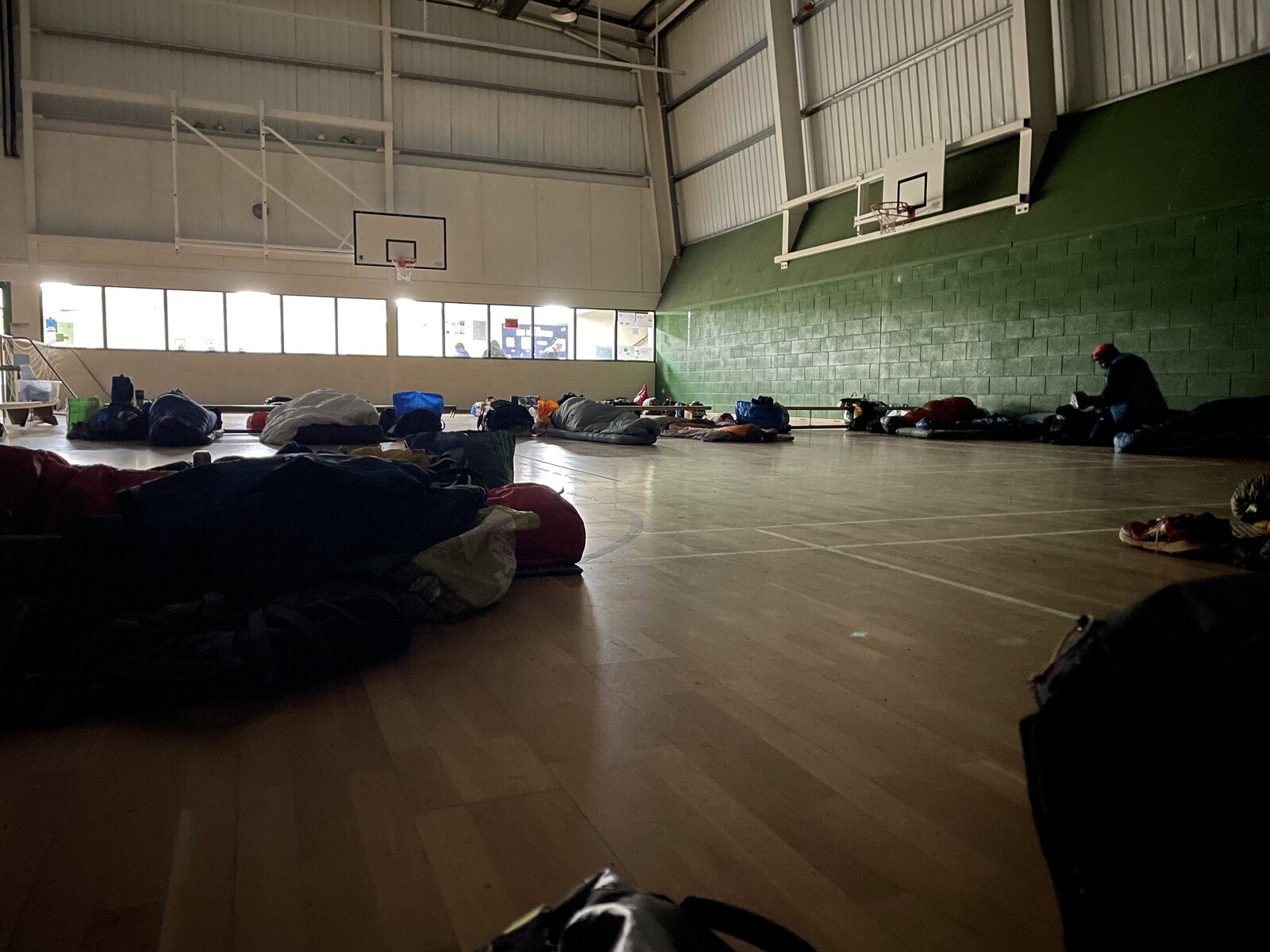
Night has well and truly set in, so I move my stuff to the attached Sports Hall to set up my sleeping arrangements. The spots along the wall have all been taken at this point, so I join with a couple of other sleepers forming an ad hoc row in the near-geographic centre of the hall. Across from me, a woman snoozes beneath a feather duvet on an inflatable mattress with fitted sheet. My decade-old sleeping bag pales in comparison. I pack my bag, knowing that I'll be in no state to try and tetris my kit in the morning. It takes 45 minutes. Then I brush my teeth and climb into bed. The lights go off in the hall, but in the corridor on the other side of the glass, the lights are on a motion sensor, so any time someone gets up to pee, the hall is flooded with light. I regret not bringing a sleeping mask.
Saturday
I doze, but don't sleep. Around 4:30, the first runners, unluckily signed up for the 5:30 bus, shuffle out of their sleeping bags and start clattering around in the semidark gymnasium. I relent to the urge to lie in for 15 minutes or so, then get up.
I wander idly into the main building for breakfast: porridge and brown sugar. I believe heartily in porridge before taxing activity: it coalesces into a big carbohydrate slug in your stomach and sits there fuelling you for hours. I nearly go back for seconds, but I don't want to be overfull for the run ahead.
I dress and brush my teeth and double-check my kit. I feel quaintly like an astronaut in my layers, my waistband and my pack, my readily-accessible gloves and hat, my technical footwear. I snap a selfie in the changing room mirror. I look like I'm about to run 61 miles. Another runner, who also looks like he's about to run 61 miles, asks to use my toothpaste. I oblige. An organiser comes into the changing room and announces last call for the 6:00 bus. That's not my bus, but I head back to the main hall to idle the next fifteen minutes or so.
When the 6:15 bus is called, I head out into the morning to stand in the queue. The air is clean and brisk and cold like water. The sky is pale blue, and the moors above the town loom green and tidy and speckled with white sheep.
I find an empty seat in the front row of the upper deck and plant it next to an Illinoisan, who has returned to the UK for a week to run the Fellsman. "We visited last year and spent some time here in Yorkshire," he tells me, pronouncing it like york-shy-er, "and I thought it was just the most beautiful part of the world I'd ever seen, just fell in love with it." He tells me that he wants to retire here, among the dales and the ancient drystone walls leading down to village pubs serving dark, room-temperature beer. I tell him that there are certainly worse places to retire. He tells me that before he can do that, he has to finish this race first, but that he's a little apprehensive as he hasn't had much opportunity to train on hills, Illinois being famously pretty flat. He tells me that he's never been through a bog, either, and when we pass a flooded field, he asks if that's a bog and how you'd traverse it. A local across the aisle from us says, "No, that's just flooding," and recalls a couple years ago when the flooding was really bad and it was all water from the side of the road across to a barn partway up the opposite hillside.
I think I spot Ingleborough dusted with snow from some ways off, and announce it loudly to anyone who cares to listen. A couple minutes later, I realise that what I'd seen is just a far-off cloud. By and by we actually spot Ingleborough and shortly arrive at quaint Ingleton in its looming shadow. A slight breeze blows as we queue up for tallies and trackers at the Ingleton Community Centre; everyone pulls out their waterproof layers for a little bit of extra warmth. A handful of energy gels spill out of my bag and I hastily scoop them up. I wonder if I've overpacked.
Ahead of me, a guy with brightly coloured tights is shivering violently. I wonder if this is cold or nerves or both. For the past week, I've been a bundle of nerves, unable to quell the butterflies when I so much as look at a map; but ever since arriving at the event, an alien calm has descended upon me: one I don't dare think too hard about. My kit has been checked and packed. I am queueing. All of the thinking of the past 6 months is behind me; ahead is only doing. The queue leads me inside and I trade my kit check slip for my race number—176—and my Fellsman tally. I collect a familiar orange wristband to scan at each of the checkpoints. A man who appears to be nearly as old as rocks scans a GPS tracker and attaches it to the strap of my backpack, exhorting me to keep the tracker on the outside of my pack and pointed towards the sky. I make my way into the mass of runners in the hall waiting for the event start. For the 400-odd starters, there are probably 50 chairs in the hall. The rest of us sit on the floor, against the wall, or stand awkwardly shoulder-to-shoulder. I go stand in the queue for the toilet for a bit of personal space.
Someone opens a glass door from the hall onto the promenade above the community centre green and I head out into the light. The day is warming quickly. I tie and retie my shoes, and then descend to the field to have my tally clipped and to scan my wristband to certify that I started the event. The die is cast.
People filter slowly onto the field and one of the organisers stands up to make a short speech, read the rules, and deliver notices. He's barely begun speaking, however, when he abruptly shouts, "Right, on your marks, go!" and the collected runners all take off across the field. I follow in a brisk walk, fumbling with my watch. We bottleneck at a gate in the fence and then cast off up the road towards Ingleborough.
It's hard not to race, a little bit, at the beginning. Everyone's tightly packed and it feels as though getting stuck behind someone here is robbing precious minutes from the end of my race. I know that this is probably not true, but I hurry a little bit and catch up with two septuagenarians discussing their successful Bob Graham Round from the previous year. These men have Gone the Distance. I pass them near the summit of Ingleborough but I have a sneaking suspicion that they will pass me in short order a little later on. (They do.)
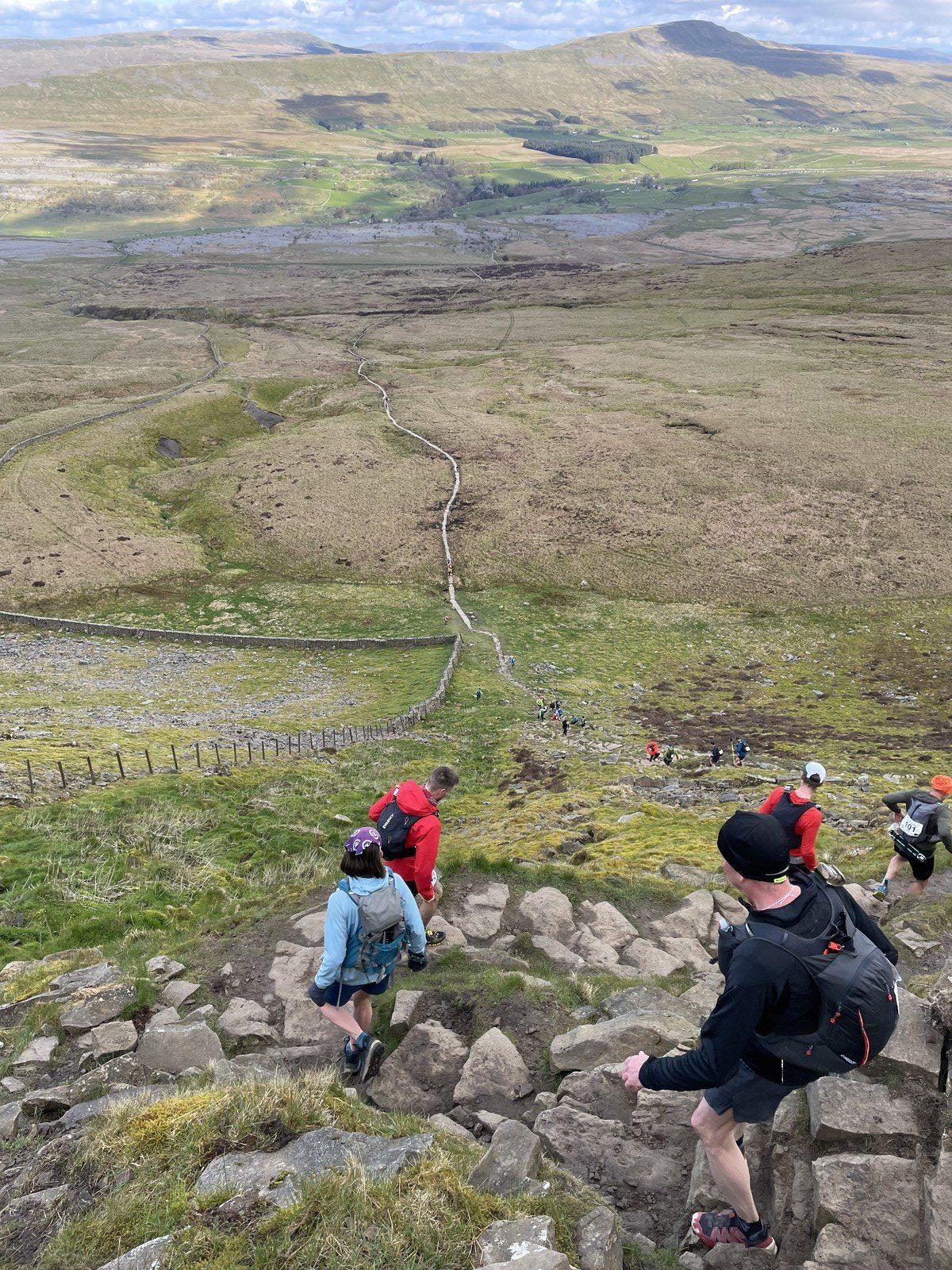
I get my tally clipped and snap a quick picture at the summit of Ingleborough. I feel strong on the descent, and roll into the Hill Inn checkpoint in decent time. I'm not pushing, but I'm not coasting, either. I refill one of my water bottles with cold water and nearly forget to grab a couple of biscuits. The order of the day is going to be eating, as much and as continuously as possible. On a recce a couple weeks earlier, I'd neglected to eat properly and crashed hard after the 45km mark.
I follow the road up to the foot of Whernside and then start climbing. This had been the most difficult climb of the day during my recce, and it's no easier this time. People catch me, people pass. I follow some runners up a line I hadn't known about beforehand and I'm shortly at the summit of Whernside, thoroughly gassed. Faster runners come barrelling down the rocky slope as fast as their legs can take them; concern for my knees keeps my pace relatively more sedate. I leave the trail for the descent to Kingsdale as an older lady passes me by. As she passes, other runners call out, "Well done, Karen!" She's familiar to me from marshalling on Great Knoutberry—I suspect that she's a regular fixture at the Fellsman. She clambers over the wall ahead of me and strikes off down the hill into Kingsdale, shrinking quickly to a yellow dot in the distance.
I cross the burn at the bottom of Kingsdale with dry feet. I'm developing a bit of a hot spot on my left foot but I'm loath to stop and interrupt my pace. I climb over the stile at the Kingsdale checkpoint and a kid gives me a fist bump and says, "Hey, it's you!" I recognise him, but I'm not sure where from. I say, "It's me!" and waddle across to the tent, where I take a brief break to refill my water bottles and cram a few energy bars and flapjacks into my face.
I'm not looking forward to the climb up Gregarath and the long traverse to Great Coum, but I've settled into a decent pace and the pack has started to thin enough that it's easy to run my own race. I head up the hill and am passed by three lads with trekking poles. One of them is streaked with mud and has a grim determination about him. I feel like it's still too early in the race to be grimly determined. The last bit of the climb is probably the steepest part of the whole route, but it's mercifully short and I'm amply rewarded at the summit of Gregareth by clear blue views over Morecambe Bay and the southern fells of the Lake District. I turn my back and set off towards Great Coum, dodging runners coming up towards the Gregareth trig point. I somehow resent having to share the trail with them.
My mood continues to decline on the traverse to Great Coum. I briefly join a bit of a conga line dodging bogs and peat hags, but we split up as the climbing starts. My left foot starts to hurt quite badly, and my leg muscles are starting to ache. I don't know quite how far I've come, or whether it's too early to start medicating—but I take a salt pill and a couple of ibuprofen anyway, why not. As I crest Great Coum I realise that my foot pain has started to abate and that my mood is lightening, as if by magic. Good ol' pills. I get my tally checked and follow another runner down from the trig point across a big moraine. I pass a runner in a bit of distress, hobbling off the hill with IT band pain. Another runner offers him some painkillers, which he turns down. "I'm out," he says, "just need to get off the hill." The weather's good and the descent isn't too technical, and he doesn't seem too worried, so I continue on. A little ways ahead, a woman flops over in a bog, head pointing down the slope, shouting in pain. By the time I get there, her leg cramp is wearing off and she's rifling through her pack for peanuts. I barely stop at the Flinter Gill checkpoint and push onwards to the knee-knocking descent into Dent.
I know that Dent is about a third of the way through the whole route, and that the worst of the climbing is behind me. I take off my pack and sit on the grass and guzzle two cups of cola and try to eat a sausage roll. For some reason it's hard to swallow. As the 10-minute mark approaches, I grab a couple of flapjacks and put them in my pocket. I will forget to eat these and will carry them for the rest of the race.
A bit of road running as great puffy clouds start to roll in. I put my headphones on and settle in for a long stint between Dent and the next aid station at Stonehouse. The route follows the Dales High Way up the back of Whernside but casts off suddenly across open country, through bog and marsh, towards the summit of the remote Blea Moor. The marshals here re-paint the trig point bright white every year, but it's nearly invisible against the tall gathering cumulonimbi. After getting my tally clipped I follow another runner over a fence, cutting the corner through sparse trees to join the path through the woods to Dent Head. I pause briefly at the mouth of the Bleamoor Tunnel, urging a train to round the bend, but alas! only when I've dropped down behind a tall embankment, out of sight of the railway, do I hear a clarion steamwhistle and see the white vapour dissipating in the air. The train is long gone by the time I come back within sight of the railway; I don't even catch a glimpse of the caboose.
A brief stint back on the roads before a luxuriant stop at Stonehouse for pasta, cake, and cola. I sit down on the grass for a little bit too long and then go back for seconds. I can feel the extra weight as I start the long trudge up to Great Knoutberry. This is familiar territory for me, but it doesn't make the climb any easier.
Near the summit, I spot Sam and Jim from a long way off; I must look pretty much like every other runner to them. I give Sam a wave and she recognises me. I stop briefly for a bit of a check-in, and then turn round and hustle back down the hill. I say "Well done," to the first person I meet coming up along the same route, and then say "Well done," to the next, so as not to make them feel bad. From there I realise that I've "Well done"-ed myself into a corner, unable to break the chain. I probably say twenty "Well done"s before there's a sufficient gap between runners for me to stare intently ahead as I pass, so ostensibly focused on the descent that I couldn't possibly address my fellow runners.
I'm developing a bit of a tweaking feeling in my left knee, so I take it a bit easier on the traverse to Redshaw, finding a good line that takes me right in to the checkpoint. There are hotdogs here, but as soon as I get into the tent I go lightheaded and a bit woozy. I ask for a hotdog anyway, and get an anemic wrinkly sort of thing between two slices of roll. It turns out to be glorious. I eat a banana, and then a slice of bread and butter. The woozy feeling subsides but I start shivering out of nowhere: on goes my jacket, and then out go I into the moorish no-man's-land between Redshaw and Fleet Moss.
A little ways out of the checkpoint, another runner catches up with me and we powerwalk up the hill together. Snaizeholme checkpoint is nearby—within sight of Redshaw, actually. I jog with the other runner—who I'm going to call S—down to the Pennine Bridleway, which takes us to Cam High Road and on towards Dodd Fell. Above us, the sky turns an ominous steel grey, but on the horizon the sun is still shining; Ingleborough is bathed in gold. Before too long, we get a bit of spitting rain that abates on the short, steep climb up to Dodd Fell.
From there, it's an easy jaunt down to Fleet Moss, wrong turn notwithstanding. I sit down and eat some bean stew. I'm still with S, who seems eager to get moving again, so we head out on the long descent into Deepdale. I remember this section being long and boring and fundamentally toothless, but from Fleet Moss onwards my knee starts giving me real trouble and the descent doesn't help. I take some more painkillers and we walk all the way to Deepdale and on to Yockenthwaite Farm in the dwindling light. Between my knee and the fading light and the dreary road that goes on and on, my morale begins to ebb. I'm not thinking of packing it in by any means, but I'm certainly not having fun.
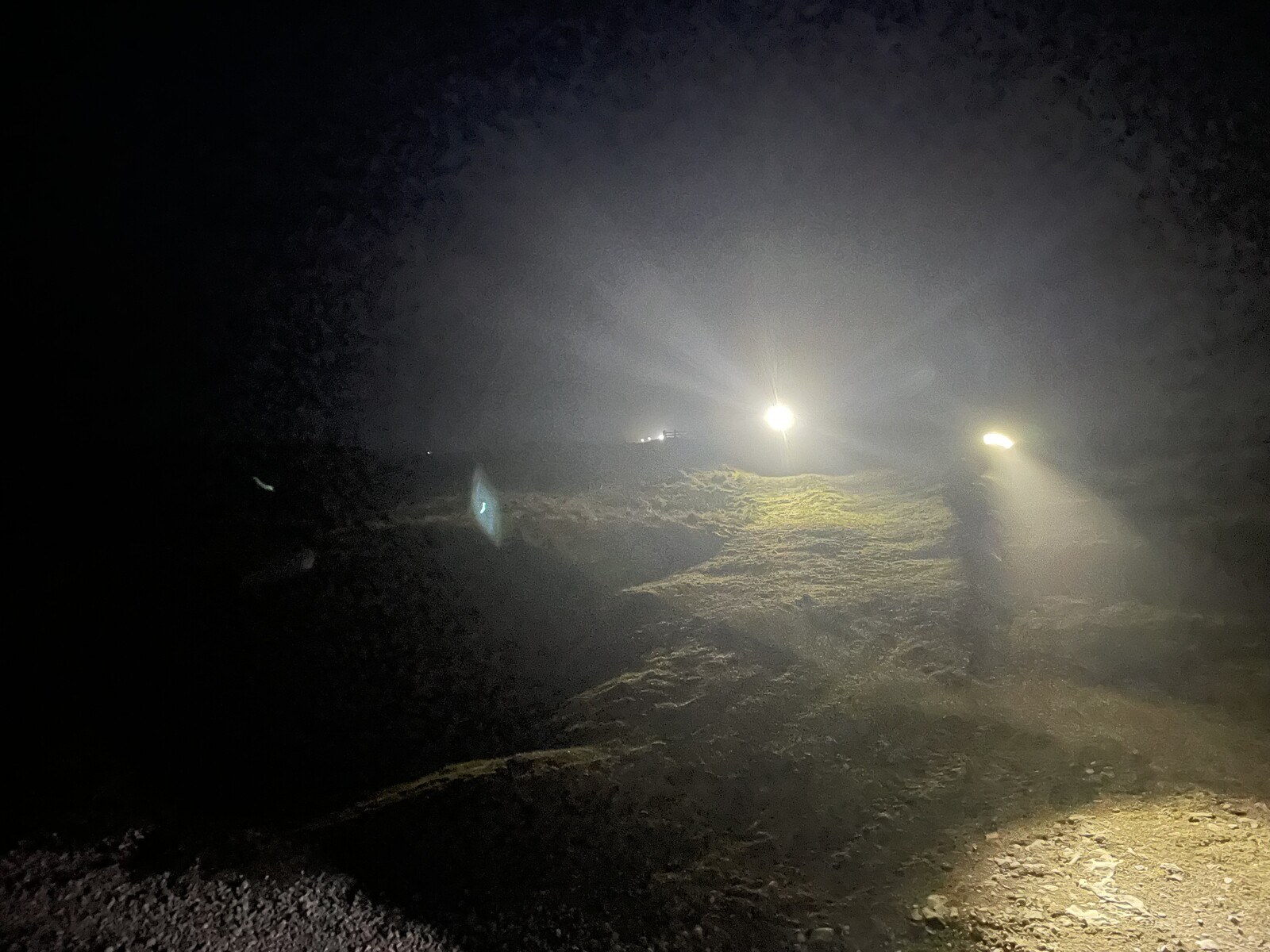
We climb directly up to Chapel Moor with a couple of other runners—walkers, all of us, at this point—and get our headtorches out. As the prospect of another climb fades behind us, and the night deepens in earnest, my mood begins to turn around a bit. While running appears to be wholly off the table for me, navigating around in the night is nothing new, and the trail from Chapel Moor on to the next checkpoint is easily followed. We make it to Hell Gap in good time. I turn around and watch as a trail of headtorches dots off into the mist. I'd imagined this moment—the trail of headtorches in the deep night—and I'm buoyed by the spirit of common suffering at work.
Sunday
Another steep descent into Cray, where the marshals have strung up multicolor fairy lights and are blaring 80s rock music into the night. I step into the tent and walk headfirst into a thick wall of heat. The scene is nearly sheer havoc: there are 30-odd people crammed into a space the size of my bedroom, jostling for space between the tables and requesting cake and bread and sports drink. There's a woman sitting on a bench with a blank stare on her face, wrapped in a thick fleece blanket. She's the same colour as the moon. A man next to her has his shoes off and his feet are bloodless, pale, yellow and wrinkled. A medic in a green polo is bouncing between three or four different people. Outside the tent, the minibus bound for Threshfield is full of retired runners. I catch S's eye: we've got to get the hell out of here. As we leave, he tells me that Cray is notorious for retirements: it's the first nighttime aid station for many folks, and it's nice and warm, and morale is usually quite low. "If you can leave Cray," he tells me, "you can finish the Fellsman." The trail starts to climb into the dark.
I stave off shivering with climbing. I don't remember the Buckden Pike checkpoint being quite so far away—but distances are all distorted in the dark. More fairy lights at the summit of Buckden Pike, where a lone Scot clips our tallies and points us in the right direction. There's a sort of festive jollity about him that carries S & I briskly across the flagged path to the Polish Memorial Cross, which I completely miss in the dark. Easy going on soft, well-broken trails down towards Top Mere. We spot the checkpoint's red flashing beacon from a good distance but close with it remarkably slowly. My knee seems to be alright with walking, but even 15 seconds of running makes it ache and seize. Past the checkpoint, it's more easy going on to Park Rash.
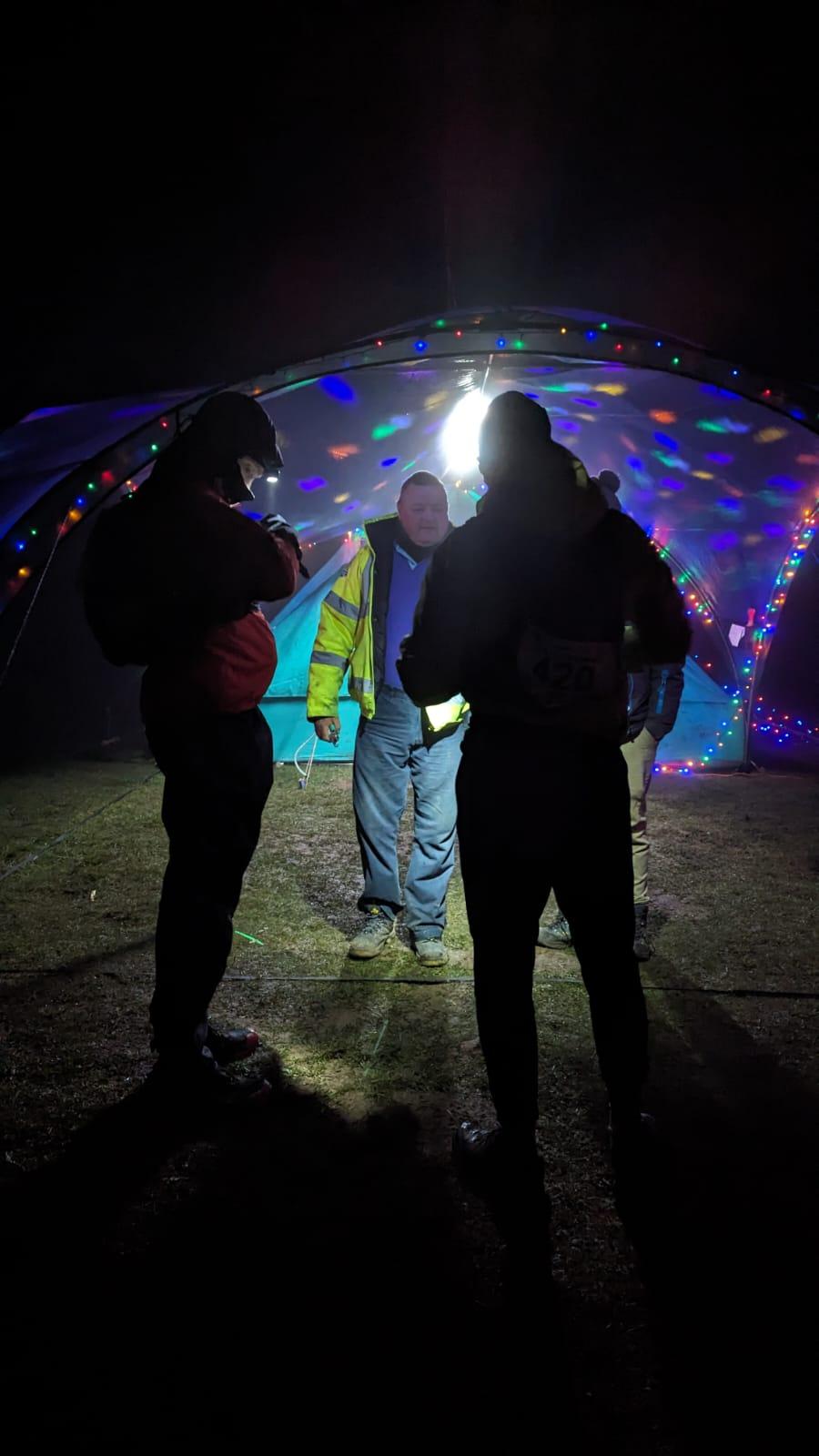
The checkpoint here is mercifully much more low-key than Cray, but I notice that after a minute or two of inactivity my body starts to shiver pretty much uncontrollably. I don't feel cold, which is the weird thing. I sit down to put on my waterproof trousers—for warmth—and just about manage to shove four or five slices of thickly-buttered sandwich bread down my gullet before I can't bear the shaking anymore.
I share another round of painkillers with S; he tells me quite how far past midnight it is. I have completely lost track of time: at once I feel like it's only been dark for maybe an hour? but also that it has been at least an eon or two since I last saw sunlight. The notion that I'm actually participating in the same event as I was when I was at Fleet Moss—let alone Dent!—is nearly unfathomable. I have been running (well, walking) for longer than I can understand, and I will keep walking until I'm done. It doesn't occur to me that this is strange, or that my brain isn't working quite at full capacity; I feel surprisingly lucid. Not sleepy at all, which is strange given that it's like 2 am. The inability to properly cogitate feels more like a happy distraction: it's not that I can't think of the time, nor the distance I've covered, nor even, at this point, my wellbeing—it's just that I don't, since I'm occupied by the climb up to Great Whernside. I'm so near the end that I can almost see it.
The checkpoint at Great Whernside is sort of nestled between some big rocks in a way that is extremely disorienting to a runner in the dark. It doesn't help that there is no clear path down the back of the hill in the direction that we want to go. The marshal point us, after several attempts, in the right direction, and we find the fence and follow it for a little while. Shortly the fence enters a deep bog that we struggle to circumvent without clambering over the fence and back again severally. We catch sight of headtorches ahead and close with them remarkably quickly: they swivel wildly in the night but don't appear to make any forward progress. Just as we close to calling distance with them, they suddenly rubberband back off into the night. We realise as we arrive at the spot where they'd stopped that we'd all wandered into a cataclysm of peat hags. We follow their deep footprints through the black mud and clamber back up the other side on our hands and knees. The lights have long disappeared into the mist.
A steep descent—bad on my knee—drops us out of the fog and at once the whole hillside before us is made clear: a dozen headtorches winding off for miles across the black bulk of the hill, an impenetrable shield of darkness. Before long we join a gravel track following a tall stone wall. I'd expected the next checkpoint to be along here somewhere, but I can't find it. It appears suddenly just around a corner. God bless the marshal standing out here in the dark all night. When he clips my tally, it suddenly occurs to me quite how many holes there are. We continue on.
A trio of red beacons mark our way across empty fields. We pass under an old tree, the first I'd seen since Deepdale. I don't know why, but the tree leaves an impression on me. The night is remarkably still: very little wind, some light fog. We cross another field. Suddenly, emerging from the dark, a gate opening onto a broad walled green lane. This is another moment I've been looking forward to. This track takes us down off the moor to Yarnbury, the last checkpoint before the finish.
S and I mostly don't talk on the descent. We've been keeping up good conversation for most of the past 40 kilometres: what brings us to the Fellsman, what kind of training we've done, how many climbs there are left to go. S asks me what I'd like to eat most at the minute, and I really struggle to think of anything. I don't really feel like eating. He says that he could go for a nice fat chippy. I think that sounds a bit too oily at the minute.
As we arrive at Yarnbury, we're greeted by an enthusiastic young person who clips our tallies and directs us to a table of mostly-untouched food. We're about 3 kilometres away from the finish line; I expect that most runners passing through here stop to have their tally clipped and then bounce without eating. I grab some Oreos anyway, thank the marshal, and head on down the road. S points out some light in the sky and speculates that it's nearly morning. I have no idea what time it is, but the concept of morning seems ludicrous.
The town of Grassington rises around us with no fanfare. S's family is there to greet him, cheer him on, and then hustle on to Threshfield across the River Wharfe to meet us at the finish line. We cross the empty road without even looking, descend to the bridge. I look down at the grassy banks, the dog tracks and the rushes. I think to myself that I don't ever want to see grass again. This makes consistent internal sense at time, but writing about it in retrospect, I'm not sure what the hell I was on about. I look at the sky and find a distinct blueness in the east. Birds are chirping. Morning is forthcoming: S was right.
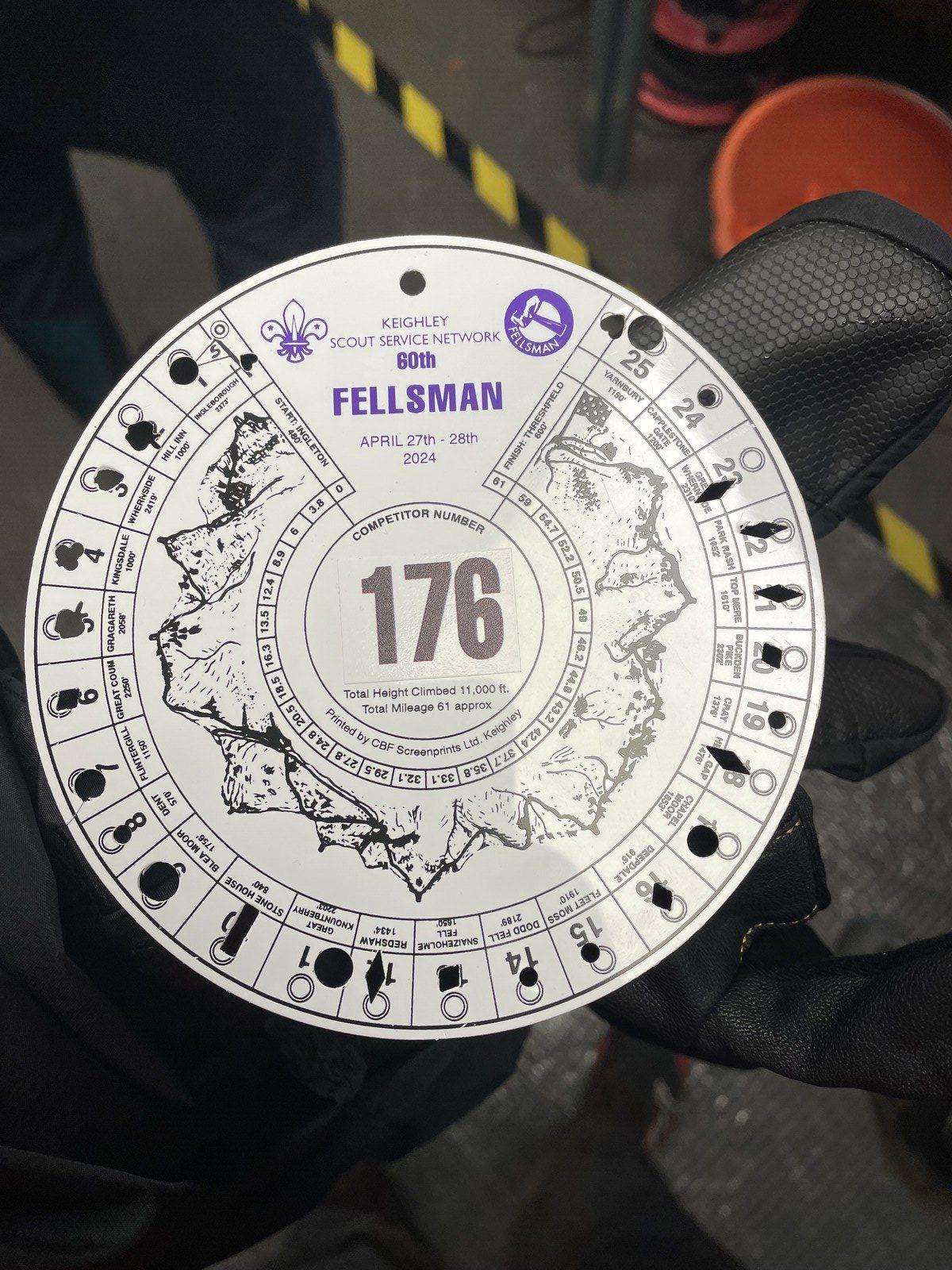
We're joined by an older fellow just outside of Threshfield. He comes barrelling down the hill at a serious clip, but eases up and walks with us to the finish. When I see the lights of the school, I feel nearly nothing at all. I suppose that's not quite true: I do feel some pain in my knee. One of the officials opens the door for us; another offers to cut our tallies off of us. I ask him to clip the spot indicating the finish line. He obliges. Then I ask if I can have it back briefly, to take a picture of it. He assures me that it will be mailed to me in a week or two, but I insist on the photograph. I spot a bowl of jellybeans on the table, and grab a handful. I discover instantly that there was a food that I was craving all along. It was jellybeans.
S and I take a picture together outside of the school. My mouth is still full of jellybeans and I panic as his wife lifts the camera and I try to rearrange my face so it doesn't look so much like my mouth is full of jellybeans. We shake hands and S negotiates with his family to return to his gran's for a bath. When they leave, I wander back to the Sports Hall and meander into the bathroom. It's nice and warm in there so I sit awhile, not doing anything. I suspect that from the outside I probably look shellshocked or something, but I don't feel shellshocked. I'm not sure if I even feel that tired. I turn my phone back on and a flood of text messages come in. I text, "Done", and then, "Shattered" to the group chat. Then I go into the changing room and remove my shoes.
Next
Why does anyone buy a Tentbox?
Why am I suddenly seeing so many Tentboxes atop family hatchbacks in Asda car parks?
Previous
In Newcastle to see Zoe Explains It All at the Tyne Theatre & Opera House on 10 May 2024.